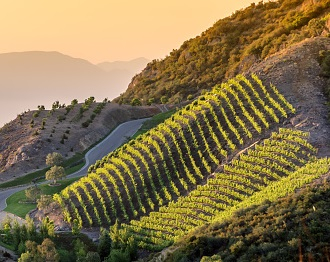As winter settles in and evening descends early, I find myself looking around in my cellar for Cabernet. But not just Cabernet—mountain Cabernet. The kind with a nice grip of tannin. With a sense of majesty. Why are mountain vineyards special? Here are some things we know. Continue Reading.
First, although it may be stating the obvious, mountain vineyards are usually relatively small. The vineyard must be squeezed within the caverns, canyons, and rolling contours of the mountain face. Every vine in a mountain vineyard counts. Every vine is given care and attention. Attention to detail in the vineyard is where all great wines begin. Mountain vineyards usually have wonderful exposition to the sun. Think about a solar panel and how it’s tilted on a 45 degree angle. The middle parts of mountain slopes are called “thermal belts” because they capture the rays of the sun perfectly. Balanced ripeness is crucial to great wine.
The soils on mountain vineyards is usually thin and eroded. Sometimes the vines are growing in virtual bedrock. The yields from the vineyard are small. Over millions of years, erosion has carried soils and water downhill. This somewhat infertile soil would be terrible if one were growing vegetables. But the slight struggle is great for grapes which send their roots deep in search of water. Mountain soils also lead to grapes that are small–like blueberries. Small grapes have a higher ratio of skin to juice. Because so much aroma, flavor, and tannin are lodged in the skins, mountain wines often have intense flavors and, for red wines, copious tannin and therefore considerable structure.
Because of their elevation, mountain vineyards often get a lot of sun. They warm up early in the day. But also because of that elevation, they are usually quite a bit cooler than the vineyards at the bottom of the mountain. So the vines are showered in luminosity, but the grapes don’t bake in heat. This gives the final wine balance and a sense of freshness.
Needless to say, mountain vineyards are expensive to farm. Every bit of the work–from planting a vine to harvesting the grapes–is slow and painstaking. And it usually has to be done by hard, because most tractors and mechanical harvesters can’t negotiate steep inclines.
And finally, mountain vineyards are part of a larger polyculture. They are often ringed by forests and other types of vegetation as well as wildlife. Where I live in Napa Valley, mountain Cabernets smell intoxicatingly of the forests around them. Goût de terroir… goût de montagne.

